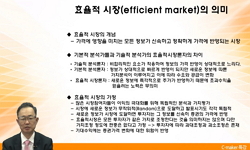본 연구는 경영학(재무, 인사조직)과 심리학간의 학제간 연구로 세 가지 연구 목적에 따라 세 부분으로 나누어 진행되었다. 첫째, 국내 개인 투자자의 과잉확신 거래행동과 수익률에 초점을 ...
http://chineseinput.net/에서 pinyin(병음)방식으로 중국어를 변환할 수 있습니다.
변환된 중국어를 복사하여 사용하시면 됩니다.
- 中文 을 입력하시려면 zhongwen을 입력하시고 space를누르시면됩니다.
- 北京 을 입력하시려면 beijing을 입력하시고 space를 누르시면 됩니다.
개인 투자행동과 의사결정의 선행요인과 결과에 대한 연구
한글로보기https://www.riss.kr/link?id=G3752731
- 저자
-
발행기관
-
-
발행연도
2006년
-
작성언어
Korean
- 주제어
-
자료형태
한국연구재단(NRF)
-
0
상세조회 -
0
다운로드
부가정보
국문 초록 (Abstract)
본 연구는 경영학(재무, 인사조직)과 심리학간의 학제간 연구로 세 가지 연구 목적에 따라 세 부분으로 나누어 진행되었다. 첫째, 국내 개인 투자자의 과잉확신 거래행동과 수익률에 초점을 두고 투자자의 잦은 거래는 손해를 가져온다는 것과 직접적인 원인이 투자자의 과잉확신에 있다는 것을 밝히기 위해 투자자 집단을 성별과 연령으로 분석하였다. 둘째, 개인 투자행동의 결정요인으로서의 성격변인에 초점을 맞추었다. 투자행동에서 나타나는 과잉반응과 과소반응은 개인의 인지적 오류에 근거한 것이며, 이러한 인지적 오류는 개인에 따라 그 오류 빈도가 달리 나타날 것이다. 이러한 비합리적 투자행동을 설명하는 인지적 오류에 대한 결정요인(determinants)으로 개인 성격변인을 탐구하였다. 그리고 마지막으로 확률 판단에 영향을 주는 위험 감수(Risk Taking)와 과잉 확신에서의 문화적 차이를 비교하였다. 본 연구에서는 모의투자 업체의 자료는 (1) 모의투자 자료와 (2) 실전투자 자료의 두 단계 자료로 구분하여 수집되었다. 매회 모의투자에서 상위 50위에 속하게 되면 4주간의 실전투자의 기회를 가지게 되는데, 본 연구의 피험자는 이들 실전 투자자들이었다. 실전 투자자는 일정 금액의 현금을 제공받아서 실제 주식 투자에 참가하게 된다. 수익이 발생하면 투자자는 원금만 업체에 돌려주고 나머지는 투자자의 몫으로 돌아가기 때문에 거래 동기는 실제와 다름이 없다. 본 연구는 피험자들의 모의투자(예선) 거래내역과 실전투자(본선) 거래내역을 비롯하여 피험자에 대한 2차에 걸친 설문조사 결과를 토대로 진행되었다. 본 연구 결과, 행동재무론 (behavioral finance) 연구와 일치하게 개인의 거래가 증가할수록 투자 수익률은 저하되는 것으로 나타났다. 자신의 투자 능력에 대한 확신이 증가할수록 역시 수익률은 감소하였다. 이 결과는 과잉 확신이 과도 거래를 유발하고 다시 수익률 저하를 가져온다는 점을 시사한다. 성격 요인들 중에서는 외향성이 과도한 거래를 초래하고, 그 결과 수익률을 떨어뜨리는 역할을 하는 것으로 밝혀졌다.
다국어 초록 (Multilingual Abstract)
This multi-disciplinary (Business administration and Psychology) study has three sub-studies: Study 1 has focused on investor’s overconfidence which we think is a major factor causing frequent trading and investment loss, and Study 2 has examined th...
This multi-disciplinary (Business administration and Psychology) study has three sub-studies: Study 1 has focused on investor’s overconfidence which we think is a major factor causing frequent trading and investment loss, and Study 2 has examined the effect of investor’s personality on his or her investment behaviors. Over- or under-reaction in investment situation may result from individual cognitive errors, which show individual differences. We have explored individual personalities as determinants which cause the cognitive errors, explaining such kind of irrational investment behavior. Lastly, we have also examined cross-cultural difference in risk taking and overconfidence, which can affect probability judgment. Data in this study have been collected from participants of stock investment simulation. Top 50 participants in each simulation have been provided with an opportunity to invest their seed money in the actual stock market for four week. Actual investment records as well as simulation data were analyzed to test our hypotheses. Two hundred participants of both simulation and actual investment have answered two questionnaires regarding personalities and investment behaviors. Corresponding to the result from the previous research in behavioral finance, the results indicated that the frequent trading behaviors, which may result from overconfidence in their own ability, were correlated to investment losses. Extraversion among other personality factors caused frequent trading, which thus decreased earnings.











